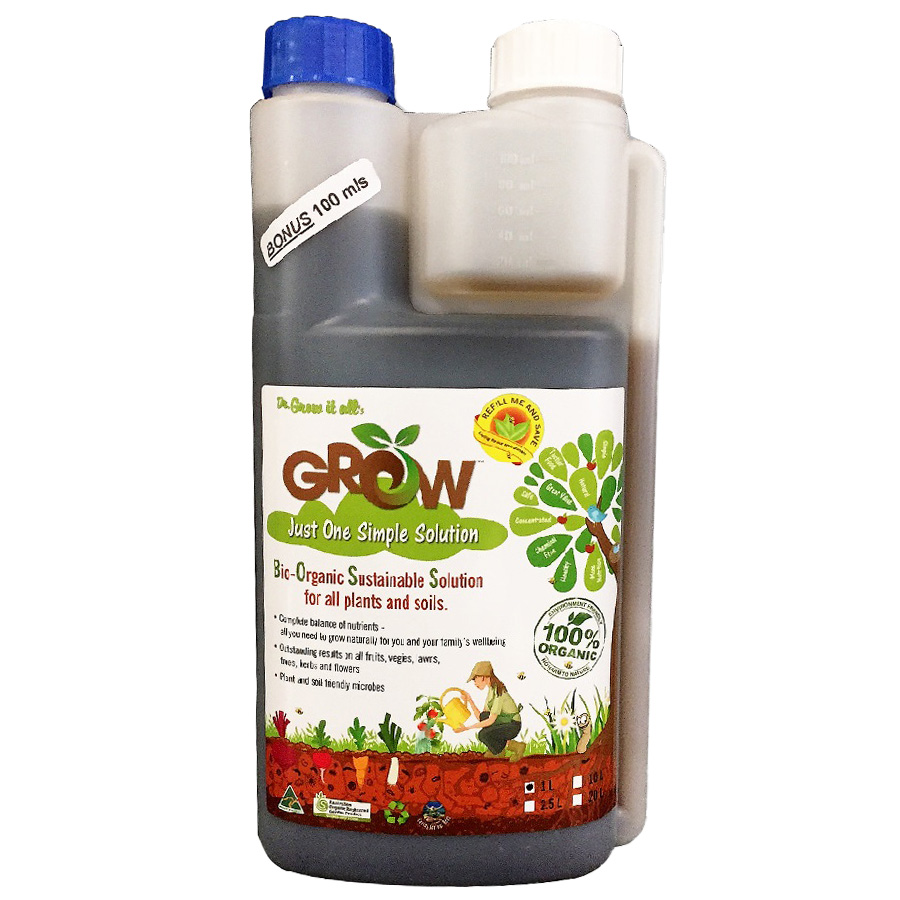Description
THIS PRODUCT: GROW Bio Organic Liquid Plant Fertiliser
GROW is a Bio Organically Sustainable liquid fertiliser, developed as an alternative to chemical fertilisers, seaweed fertilisers and other garden products.
Results
Delivers outstanding results every time it is applied to fruit and vegetables, lawns and herbs in fact anything.
Organic
Our unique liquid fertiliser has been tried and tested through 10 years of scientific research and development followed by hands-on application coupled with 5th generation farming experience.
What Is GROW?
GROW is developed from specially selected organically composted chicken manure blended to our specific requirements. The composted manure is put through our unique patented process of aerobic fermentation. Added to that process is a combination of microbial inputs and other ingredients that results in a highly refined, biologically active, high carbon and pH neutral liquid with a complete balance of macro and micronutrients.
How Does GROW Work?
GROW is a bio-fertiliser with a mix of microbial inputs developed over many years of research and although they are the company’s ‘trade secret’ here are some of the names of the beneficial bacteria, algae, fungi and other ingredients found in GROW: Azotobacter vineladii; Bacillus cereus / thuringienis; Bacillus subtillis; Bradyrhizobium japonicum; Chaetomium globosum; Endo & Ecto Mycorrhiza; Fusarlam spp; Nematodes; Ochrobactrumanthropi; Protozoa – flagellates, amoebae, ciliates; Pseudomonas aeruginosa; Pseudomonas fluorescens; Pseudomonas pseudoalcaligenesl; Pseudomonas putida; Pseudomonas stutzeri; Rhizobium leguminosarum; Sphingomonas paucimobillis; Streptomyces albidoflavus; Streptomyces celluosae; Trichoderma lignorum;
This combination helps build soil micro-flora and thereby, soil health. The importance of healthy soil and complete, plant acceptable, nutrients have been well documented by many experts over the years. The benefits of GROW can be shown in independent trials run by Dr Rogers of Applied Horticultural Research, including increased yield, improved soil health, greater resistance to pest and climatic variation, and greater water efficiency. Researchers have also found that the use of highly refined bio-fertiliser such as GROW can reduce production costs by supplementing inorganic/chemical fertiliser use through promoting improved soil microbial populations, including free-living nitrogen-fixing bacteria such as Azotobacter, improving nutrient uptake through better root development.
In General: Organic fertilizers are natural substances derived from plant, animal, or mineral sources that provide essential nutrients to plants. These fertilizers are valued for their ability to improve soil health, promote sustainable gardening and farming practices, and reduce the environmental impact associated with synthetic chemical fertilizers. Here’s a description of organic fertilizers and their common uses:
Description: Organic fertilizers are composed of organic matter or materials that have undergone minimal processing. They release nutrients slowly and steadily as they decompose, enriching the soil and benefiting plant growth. These fertilizers can come in various forms, including compost, manure, bone meal, fish meal, kelp meal, and more. Some of the key characteristics of organic fertilizers include:
- Nutrient Content: Organic fertilizers provide a balanced mix of essential nutrients required for plant growth, including nitrogen (N), phosphorus (P), potassium (K), as well as secondary and micronutrients.
- Slow Release: Nutrients in organic fertilizers are released gradually over time as organic matter breaks down. This slow-release nature reduces the risk of nutrient leaching and minimizes the potential for nutrient runoff into water bodies.
- Soil Improvement: Organic fertilizers enhance soil structure, increase water retention capacity, and promote microbial activity in the soil. They also improve soil aeration and drainage.
- Sustainable: Organic fertilizers are considered more environmentally friendly because they are made from renewable resources and often involve recycling organic waste materials, reducing the need for synthetic chemicals.
Uses:
- Gardening: Organic fertilizers are commonly used in home gardens to provide essential nutrients to vegetables, fruits, herbs, and ornamental plants. They improve soil quality, which leads to healthier plants and increased yields.
- Organic Farming: Organic farmers rely heavily on organic fertilizers to maintain soil fertility and comply with organic farming standards, which prohibit the use of synthetic chemicals.
- Landscaping: Organic fertilizers are used in landscaping projects to improve soil conditions and establish healthy lawns, trees, and shrubs.
- Container Gardening: Organic potting mixes and fertilizers are suitable for container gardening and potted plants, ensuring that nutrients are available to plants in a controlled manner.
- Crop Rotation: Organic farmers often use cover crops and green manure (plants grown specifically to be tilled back into the soil) to enrich the soil between crop rotations.
- Composting: Organic matter from kitchen scraps, yard waste, and other sources can be composted to create homemade organic fertilizer, known as compost, which is rich in nutrients and beneficial microorganisms.
- Restoring Depleted Soils: Organic fertilizers are used in soil reclamation and remediation projects to restore the fertility of degraded or contaminated soils.
- Reducing Environmental Impact: By using organic fertilizers, gardeners and farmers can minimize the environmental impact of agriculture by reducing the leaching of nutrients into groundwater and mitigating the pollution of water bodies.
Overall: It’s important to note that while organic fertilizers have numerous benefits, they often release nutrients more slowly than synthetic fertilizers. This means that they may not provide an immediate nutrient boost to plants. Proper application and timing are essential for achieving the best results with organic fertilizers, and they are often used in combination with other sustainable practices like crop rotation and mulching to maintain healthy, productive soils.


